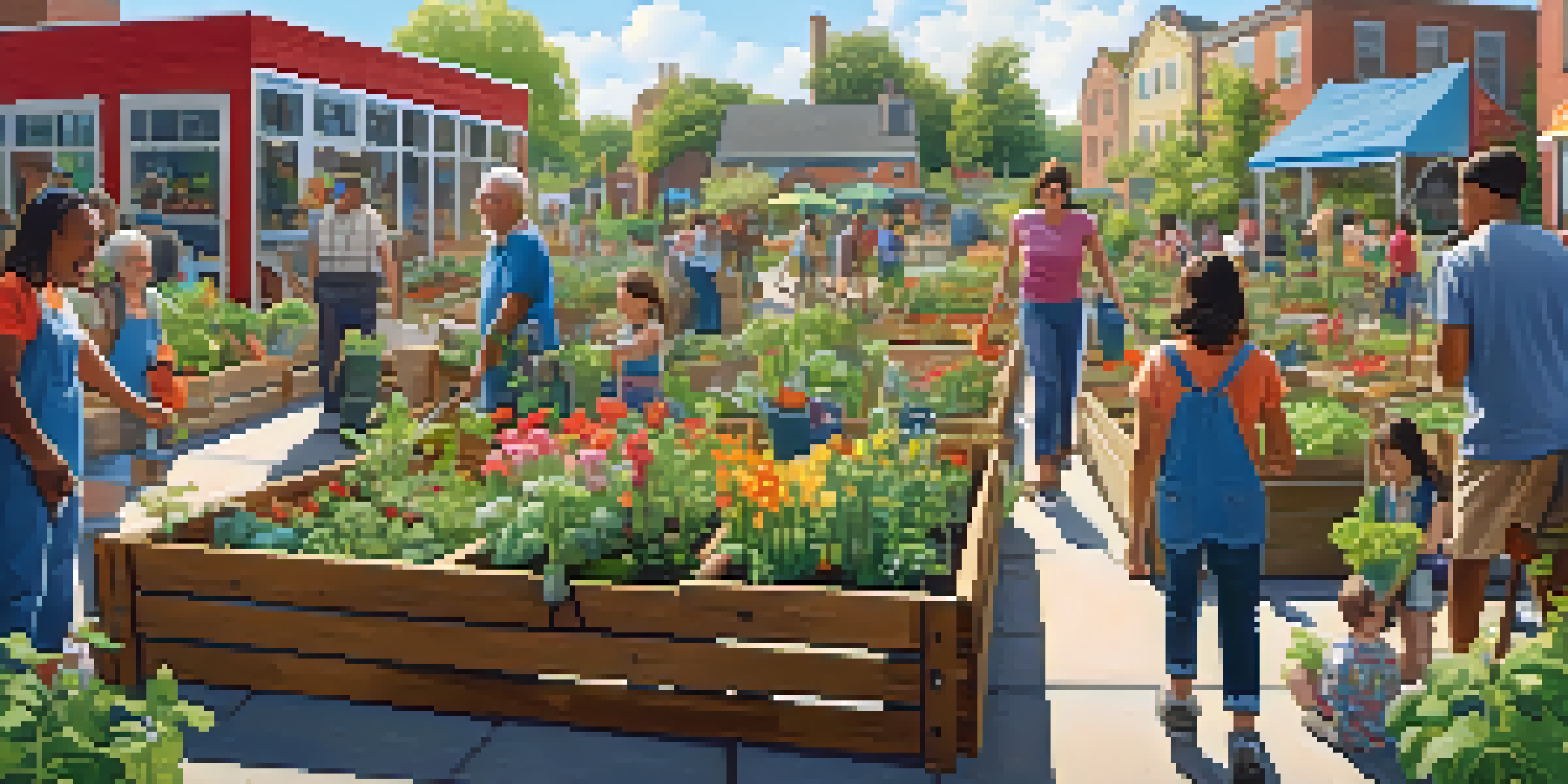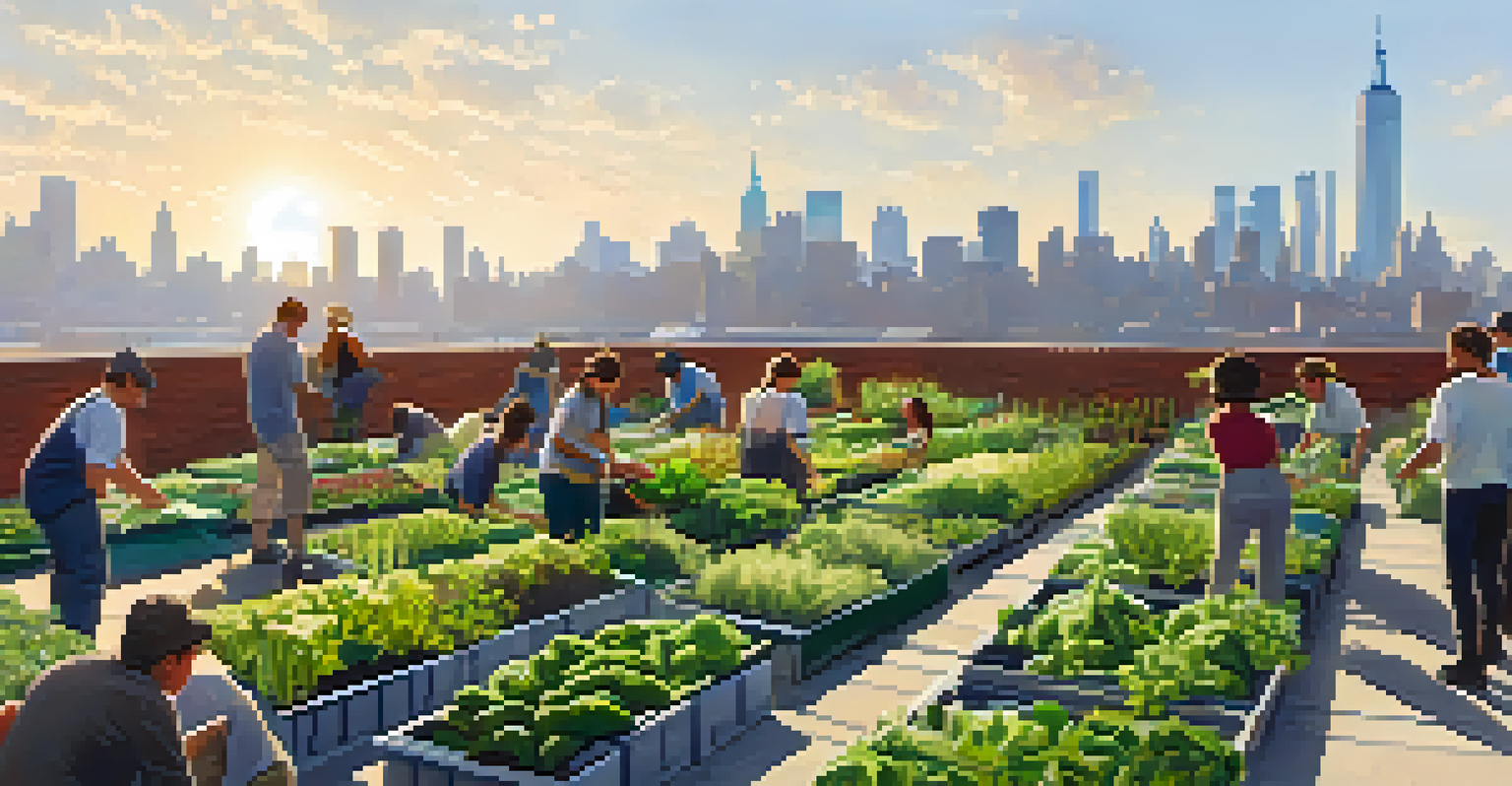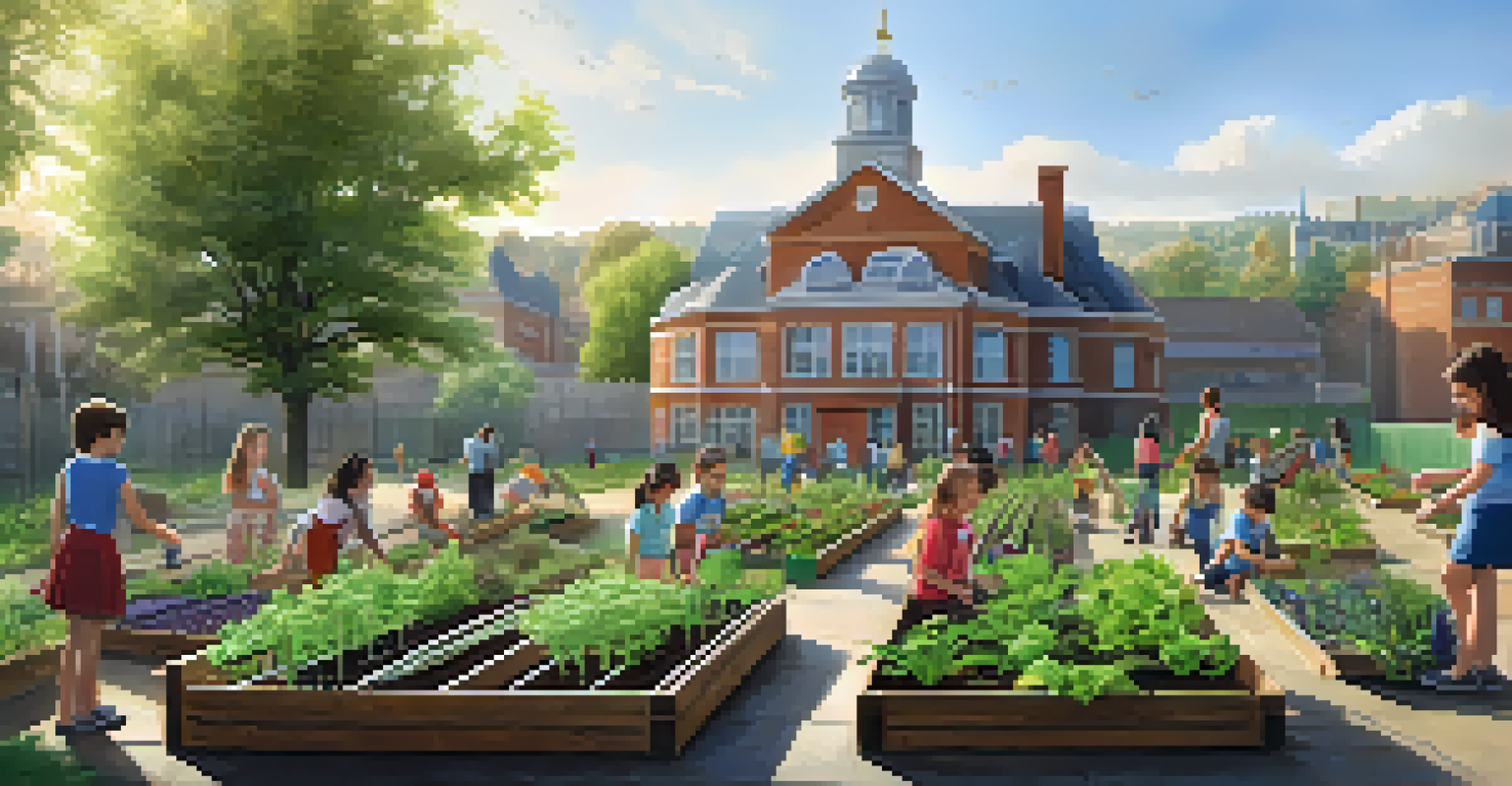Top Urban Gardens to Visit for Sustainable Community Engagement

The Importance of Urban Gardens in Sustainable Communities
Urban gardens serve as green havens amidst concrete jungles, promoting sustainability and community engagement. They foster a sense of belonging, bringing people together to cultivate both plants and friendships. By integrating nature into urban environments, these gardens contribute to biodiversity, improve air quality, and provide fresh produce.
The future will be green, or not at all.
Moreover, urban gardens are vital educational spaces where community members can learn about sustainable practices. Workshops on composting, organic gardening, and permaculture often take place here, empowering individuals to adopt eco-friendly habits. This hands-on learning experience is crucial in fostering a culture of sustainability.
In essence, urban gardens are not just about growing food; they are about growing connections. They encourage active participation, allowing community members to take ownership of their environment. This collective effort can lead to stronger, more resilient neighborhoods.
Brooklyn Grange: A Rooftop Oasis in New York City
Nestled atop buildings in Brooklyn, Brooklyn Grange is a remarkable example of innovative urban gardening. This rooftop farm spans over 2.5 acres and produces thousands of pounds of organic vegetables each year. What sets it apart is its commitment to community engagement through volunteer programs and educational workshops.

Visitors can participate in hands-on activities, from planting seeds to harvesting crops, making it an interactive experience. The farm also hosts events like farm dinners and markets, where locals can enjoy fresh produce while connecting with their neighbors. This not only supports local food systems but also strengthens community ties.
Urban Gardens Foster Community
Urban gardens not only provide fresh produce but also create spaces for community engagement and connection among residents.
Brooklyn Grange epitomizes how urban gardening can transform unused spaces into productive landscapes. It's a great reminder that even in bustling cities, nature can thrive, and communities can come together to support sustainable practices.
The Edible Schoolyard Project: Growing Minds and Gardens
The Edible Schoolyard Project, founded by chef Alice Waters, is revolutionizing how we think about food education. Located in various schools across the country, this initiative transforms schoolyards into edible gardens, where students learn the importance of growing their own food. By integrating gardening into the curriculum, children develop a deeper appreciation for nature and nutrition.
We won't have a society if we destroy the environment.
Students participate in planting, tending, and harvesting crops, which not only teaches them about sustainability but also fosters teamwork and responsibility. The project emphasizes healthy eating habits, encouraging kids to make better food choices. This hands-on approach creates a lasting impact on their lives.
The Edible Schoolyard Project is a shining example of how education and gardening can go hand in hand. It illustrates the potential for urban gardens to shape the next generation's understanding of food systems and environmental stewardship.
The South Central Farm: A Historic Community Space
The South Central Farm in Los Angeles once stood as one of the largest urban farms in the United States. Although its land was threatened in the mid-2000s, the farm became a symbol of community resilience and activism. This garden not only provided fresh produce but also served as a gathering place for diverse cultures.
Community members rallied to protect the farm, demonstrating the power of collective action. They organized events, workshops, and educational programs, fostering a strong sense of identity and purpose among participants. The South Central Farm represented hope and unity in the fight for sustainable urban spaces.
Education through Gardening Initiatives
Programs like the Edible Schoolyard Project demonstrate how gardening can be integrated into education, teaching children about sustainability and nutrition.
While the farm's future remains uncertain, its legacy continues to inspire urban gardening movements across the country. It reminds us that gardens can be more than just plots of land; they can be powerful tools for social change and community empowerment.
Community Gardens: Bringing Neighbors Together
Community gardens are a cornerstone of urban green spaces, allowing residents to cultivate their own plots while fostering camaraderie. These gardens vary in size and design, but they all share a common goal: to create a sense of community through gardening. Participants often share resources, seeds, and gardening tips, reinforcing bonds between neighbors.
In addition to growing food, community gardens often host events such as potlucks, workshops, and seasonal celebrations. These activities create opportunities for social interaction, helping to break down barriers and build friendships. A thriving community garden becomes a hub of activity, enriching the neighborhood's social fabric.
By participating in community gardening, individuals not only contribute to their local ecosystem but also strengthen community ties. These shared spaces promote inclusivity, education, and a deeper understanding of sustainable practices, making them essential for urban living.
The Role of Urban Farms in Food Justice
Urban farms play a crucial role in addressing food justice, a movement focused on ensuring equitable access to healthy food. Many urban areas, particularly low-income neighborhoods, suffer from food deserts—areas with limited access to fresh produce. Urban farms work to bridge this gap by providing locally grown food while engaging the community.
These farms often offer affordable produce through community-supported agriculture (CSA) programs, where members pay upfront for a share of the harvest. This model not only supports local economies but also empowers community members to take an active role in their food systems. Workshops on cooking, nutrition, and gardening further enhance this mission.
Urban Farms Address Food Justice
Urban farms play a crucial role in combating food deserts, ensuring equitable access to healthy food while empowering local communities.
By prioritizing food justice, urban farms help to dismantle systemic barriers and promote healthier lifestyles. They illustrate how sustainable practices can lead to broader social change, creating communities that are nourished both physically and socially.
Urban Gardening as a Tool for Mental Health
Engaging with nature has been shown to have significant mental health benefits, and urban gardening offers a perfect outlet. Spending time in green spaces can reduce stress, anxiety, and depression, making urban gardens essential for personal well-being. By nurturing plants, individuals also cultivate mindfulness and a sense of purpose.
Many community gardens and urban farms host therapeutic gardening programs, where participants can connect with nature and each other. These programs promote social interaction, allowing people to share their experiences and support one another. The act of gardening can be particularly healing, providing a sense of accomplishment and joy.

Urban gardening not only contributes to physical health through fresh produce but also nourishes the mind and spirit. These green spaces remind us of the importance of nature in our daily lives, fostering a holistic approach to well-being.
Visiting Urban Gardens: A Call to Action
With so many inspiring urban gardens around the country, visiting them can be an eye-opening experience. Each garden tells its own story of resilience, community, and sustainability, inviting visitors to engage with their surroundings. Whether through workshops, farm-to-table events, or simply strolling through the greenery, there are countless ways to get involved.
Supporting urban gardens can take many forms, from volunteering your time to participating in local events. By getting involved, you contribute to the sustainability movement while fostering connections with your community. Every small action, whether planting a seed or attending a workshop, makes a difference.
So, why not explore your local urban gardens? They offer a unique blend of education, engagement, and enjoyment, encouraging us all to be stewards of our environment. Together, we can cultivate a greener, more sustainable future.